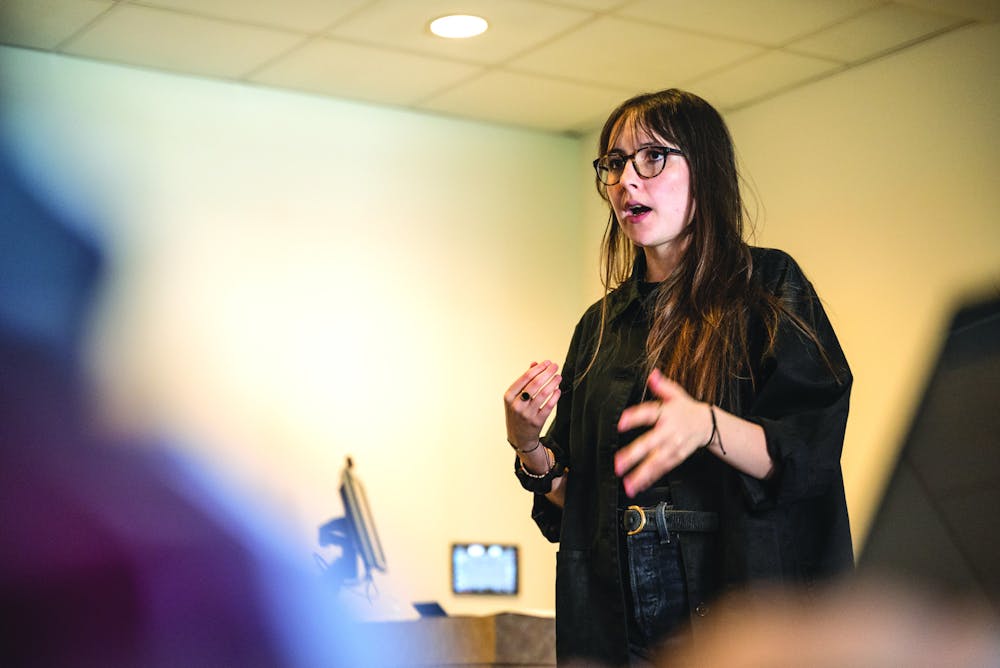Laura Correa Ochoa connects her students with revolution

In her syllabus for her course HIST 237 Radicals in the Americas, Laura Correa Ochoa poses a question: “What worlds were radicals in the Americas imagining and building?” Ochoa said her mission is to bring to light the role racial inequality has played in the recent history of Latin America and the Caribbean, especially in her birthplace of Colombia.
“I’m very invested in telling a history that centers Black and Indigenous political participation and intellectual contributions,” Ochoa said. “That allows us to see how central hierarchies of race and racism have been to the development of 20th century and 21st century Colombia politics.”
Growing up in Colombia, Ochoa and her family were witnesses to violence and conflict within the country. When she was 10 years old, she left for the United States with her family as refugees and moved to Canada soon after.
From there, she obtained a B.A. at the University of Toronto and then a subsequent Ph.D. at Harvard University in 2021. Throughout her education, Ochoa always knew she wanted to understand history from a marginalized perspective.
“My entrance into history is from a social justice standpoint,” Ochoa said. “History offers us unique tools to understand the configurations of race, class and gender from very nuanced and complex perspectives. Because of my personal and family’s trajectory with the world … I was always invested in understanding history and the dynamics of race, white supremacy, racial capitalism and how they informed the development of Colombia.”
Building on her perspectives on Latin American and Caribbean history, Ochoa designed the course “Radicals in the Americas” two years ago. In the class, Ochoa said she puts an emphasis on progressive transnational radical movements, especially those brought by Black and Indigenous thinkers and activists from across the U.S., Cuba, Chile and Africa.
“We look at the Cuban revolution and its connections with decolonization struggles in Africa and the centrality of those struggles, informing activism that happens in other places, such as in the United States, where the Black Panthers were very connected with the transnational political movement,” Ochoa said. “If we look at the critiques of empire that the Black Panthers made, they are similar to critiques revolutionaries in Cuba were making or revolutionaries in Chile or those in Africa.”
According to HIST 237 student Ajhinae Brooks, Ochoa connects past perspectives on radical movements to the present.
“Professor Ochoa explains how intersectionality still is a really big issue,” Brooks, a Lovett College sophomore, said. “The civil rights movement has shifted toward the Black Lives Matter movement. The intersectionality between Black men and Black women affected the outcomes of the civil rights movement, and it is still affecting the Black Lives Matter movement today.”
Bridging the past and present is not the only way that Ochoa shares her perspectives. She encourages her students to think critically about the readings and text she provides.
“By engaging closely with the sources, speeches, writing and the text that were produced by these thinkers and activists, hopefully [students] can come out with a nuanced understanding of how radical politics is and some of its tensions and contradictions,” Ochoa said. “I hope they feel interested in learning about places and people they are unfamiliar with, and challenge themselves to go out of their comfort zones … Some of these movements are very inspiring and have a deep impact on the world.”
According to Brooks, Ochoa makes herself part of discussions with the students in class, sharing her own points of view and turning lectures into conversations.
“I don’t feel like any of the work we’re doing is busywork,” Brooks said. “It’s more conversational than it is an actual lecture. It makes you want to better the world in a way that equality can be given to everyone. ”
More from The Rice Thresher

New student center to ‘complete’ central quad
Breezeways, arches and outdoor seating will abound at the Moody Center Complex for Student Life set to break ground May 8. The 75,000-square-foot complex was designed by architecture firm Olson Kundig and has an expected completion date of fall 2027.

Best study snacks to fuel your finals
Finals are creeping up on us, and that means hunting season for the best study snacks on and off campus. Below are some that are sure to see you through the most enigmatic paper prompts and puzzling practice questions.

Head over handlebars: a brief history of Beer Bike accidents
In the first heat of the women’s race in this year’s Beer Bike, Melissa Geng said she was biking faster than she ever had, adrenaline pumping through her veins. All was going well, until she crashed into the fence of the alumni viewing area at the turn of her second lap.

Please note All comments are eligible for publication by The Rice Thresher.